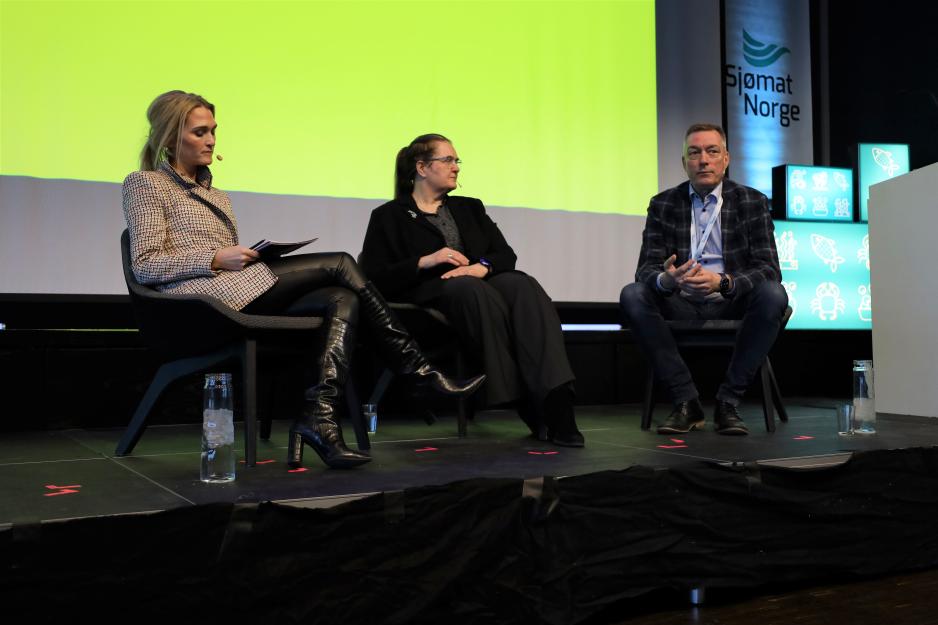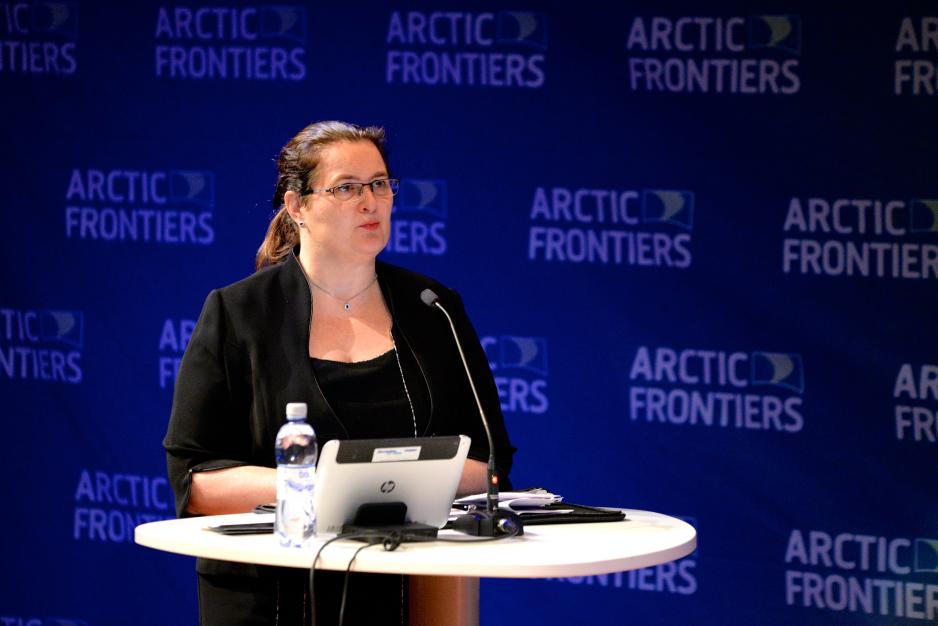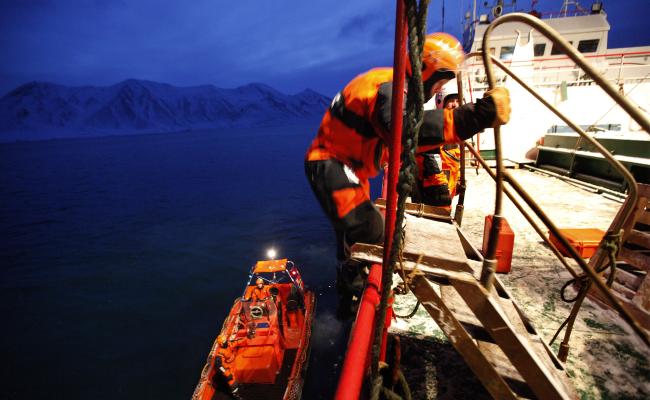EU Proposes Closing Ports for Russian Vessels, Norway May Make Some Exemptions

A panel consisting of (from the left) Head of Communications Kristin Langeland at Seafood Norway, Liv Monica Stubhold of Selmer Law Firm, and Director Frank Bakke-Jensen of the Norwegian Fisheries Directorate discussed sanctions and fisheries cooperation at Seafood Norway’s annual conference this week. (Photo: Hilde-Gunn Bye)
The EU has proposed a ban to prevent Russian vessels from arriving at its ports. Norwegian authorities are considering the proposal, though some exemptions may be made.
The President of the EU Commission Ursula von der Leyen this week presented the EU’s proposal for new sanctions against Russia. This fifth sanction package a.o. includes a ban against Russian vessels and Russian-operated vessels in EU ports. The EU Commission also wants to introduce specific import bans on products such as seafood.
The proposals must first be adopted by the EU’s member states.
Considering ban
“Norway stands with the EU and other countries in making sure sanctions hit strongly and effectively, and we will also carry out this sanction package. However, we will now go through the proposals from the Commission and consider whether there is a need for adjustments when they are to be worked into Norwegian legislation”, says Fisheries and Ocean Minister Bjørnar Skjæran (Labor).
Partner Liv Monica Stubholt of Selmer Law Firm says new sanctions confirm that there is broad political will to hit hard.
“So far, Norway has acted in line with the sanctions decided upon by the EU. The Ministry of Trade, Industry and Fisheries now confirms that this [the new EU proposal] is under consideration”, she says to High North News.

Liv Monica Stubholt is a business lawyer and partner at Selmer Law Firm. She has held a series of top positions in the Aker corporation and has previously been state secretary at the Ministry of Foreign Affairs and also the Ministry of Oil and Energy. She has also been Chair of the Norwegian-Russian Chamber of Commerce. (Photo: Pernille Ingebrigtsen, Arctic Frontiers)
May be exemptions
When asked what effects potential sanctions will have for fisheries cooperation between Norway and Russia in the Barents Sea, she points out that this cooperation has been stable for a long time and that this also is important for fisheries activities in the High North.
“However, there is no doubt that the sanctions challenge this”, she says and adds:
“There will be some exemptions and clarifications from the ban on port arrivals, and the question is what this will entail. Will there be wide and extensive exemptions, will the ban in practice not make much of a difference? If the exemptions are to be narrow, it will be interesting to observe to what extent Russia will – as it has previously done – claim “port of refuge”.
Stubholt explains that new sanctions from the EU and Norway against Russia may trigger further counter-sanctions. These may naturally affect import of Norwegian fish, she adds.
“Of course, Norwegian authorities consider such relations when they do their demanding assessment of a precise Norwegian sanction level against Russia’s attack on Ukraine, which is a violation of public international law.”
Ripple effects
High North News has in a series of articles highlighted what consequences a ban against Russian vessels in Norwegian ports may have.
On the one hand, there are the economic consequences, and restrictions will a.o. hit also the Norwegian maritime companies providing supplier services when the vessels dock in Norwegian ports. Such a measure is, however, not perceived as critical for the Norwegian fish industry, CEO Svein Ove Haugland of Norges Råfisklag has stated to High North News.
Senior Researcher Andreas Østhagen at the Fridtjof Nansen Institute explained to HNN that the fisheries cooperation between Norway and Russia will not necessarily come to an immediate halt.
“The point is that it may lead to a series of ripple effects that over time can endanger the cooperation about fisheries management”, he argues.
“We must talk about what resource management and security policy challenges this may entail in the longer run. We are entering into an area in which we should think really carefully and not just blindly follow the EU’s sanctions. The EU has neither cooperation with Russia in the Barents Sea nor a fish protection zone around Svalbard to worry about”, Østhagen added.
Russia was recently also excluded from activities of the international marine research council, ICES (International Council on the Exploration of the Sea). The ICES provides quota advice for the Barents Sea cod stocks managed jointly by Norway and Russia. However, allocating the quotas in the Barents Sea between the two countries is up to Norway and Russia.
“This is dramatic for the fisheries management of the North-East Atlantic. ICES advises on quotas for all fisheries of a certain size in the entire North-East Atlantic and Russia is an important actor in fisheries here. Russian researchers also hold a key role in the Council, Research Professor Geir Hønneland said to High North News regarding the exclusion.
Also read
This article was originally published in Norwegian and has been translated by HNN's Elisabeth Bergquist.


